When your cat is your family, you feel their loss as deeply as you would with any other loved one. They were with you every day, for both the good and the bad. Your cat was your sounding board when you were upset, your cuddle buddy on cozy nights, and your best friend no matter what. They were an important part of your life, and it’s natural for their death to be a heartbreaking, and even traumatic, experience.
Coping with those intense feelings of grief can put life at a standstill. It will always be difficult, but these tips from grief support professionals will help.
Let it Out
It’s normal for people to feel like they need to hold in their emotions. We do it to protect ourselves from the people who don’t understand our grief, and we think that by ignoring the pain, it will go away. But the truth is, holding back will not help. Grief is something that will fester and grow. It’s necessary to acknowledge those feelings before you can start the process of moving on.
To acknowledge your grief about the death of your cat, start with a single conversation. Choose a person who will not judge you or dismiss your feelings. They don’t need to say anything back, all they need to do is listen. Talk to them about your fondest memories of your cat since the first day you met until the day you said goodbye. If you don’t have anyone you’re comfortable talking with, there are support groups and hotlines meant for this exact purpose. And when you’re done talking, let yourself cry, scream, or pound a pillow. Do whatever you need to do to let your emotions out.
Here are a few grief support resources:
- ASPCA Pet Loss Hotline: 877-474-3310
- Cornell University Pet Loss Support Hotline: 607-253-3932
- Tufts University Pet Loss Support Hotline: 508-839-7966
- Ohio State University also has a resource guide for support groups, online chats, and hotlines. You can find it here.
Address Feelings Of Guilt
Since we can’t have our pets live forever, we settle for the hope that they’ll pass peacefully in their sleep after a long and happy life. But for many pet owners, this isn’t how it works. So many cat owners are faced with the difficult decision of euthanasia. And while euthanasia is an act of love meant to prevent pain and suffering, it’s never easy. Many cat owners face feelings of guilt along with their grief.
Instead of viewing euthanasia as ending your cat’s life, you need to see it as a gift. As hard as it is, it’s a decision that spares your beloved cat from suffering during their final days. If you’re feeling guilty, it helps to talk it out and face those feelings head on.
Find Closure
When a human family member passes away, people come together to recognize the loss and grieve together. There are funerals, memorial services, and special ceremonies dedicated to the deceased, but they also help the living find much-needed closure. Consider doing the same thing for your cat.
Many people find it helpful to have a small gathering where people can come together to celebrate a pet’s life. It can happen after a pet’s death, before a scheduled euthanasia, or even during the euthanasia procedure. If that doesn’t feel right, there are also other ways to recognize your loss. You could have a memorial made for your cat or make a donation to an animal shelter in their name. These types of acts can be extremely cathartic and help bring peace and understanding during a difficult time.
Don’t Feel Pressured to Move On
You might feel like you need to be “back to normal” within a few days after the death of your cat. Or maybe your friends and family were supportive at first, but now they’re pressuring you to move on. It’s important to remember that there is no timeline to grief. Grief is an individual process, and everyone must take it at their own pace.
Seek Help When You Need It
If the death of your cat starts to affect your long-term emotional health, you’re encouraged to reach out to a mental health professional. It is possible to develop symptoms of PTSD after the death of a beloved cat. Losing sleep, unexplained irritability, obsessive thoughts, panic attacks, and consistent nightmares are signs you need professional help. Talking to a trained professional can offer a way forward.
There will always be people that will say things like, “It was just a cat.” While these comments are hurtful, you have to know that they simply aren’t true. Psychologists say grieving a beloved pet can be just as painful (and even more so) than that of a human family member. It’s important to acknowledge those emotions and work through your feelings. There’s no doubting that it will be difficult. But take it one breath at a time and incorporate these strategies into your everyday life.


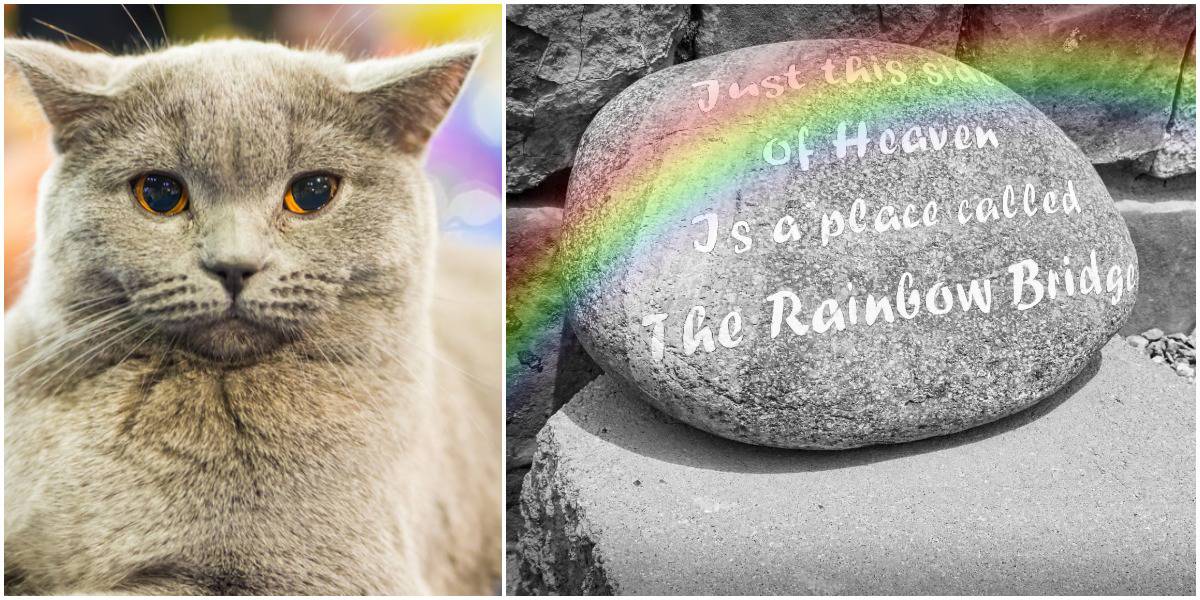
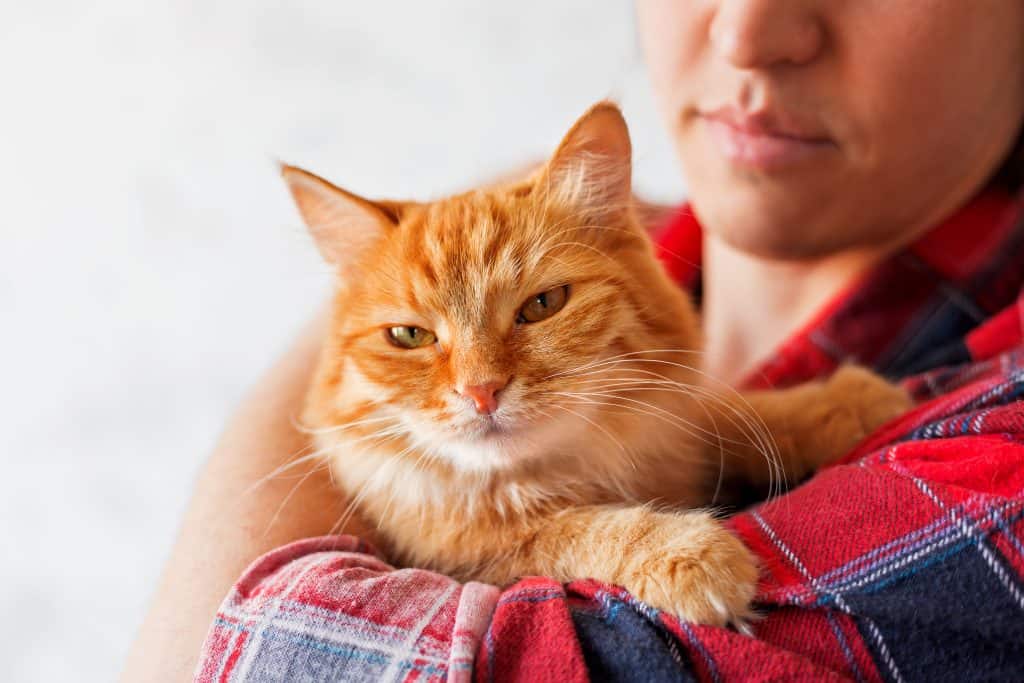
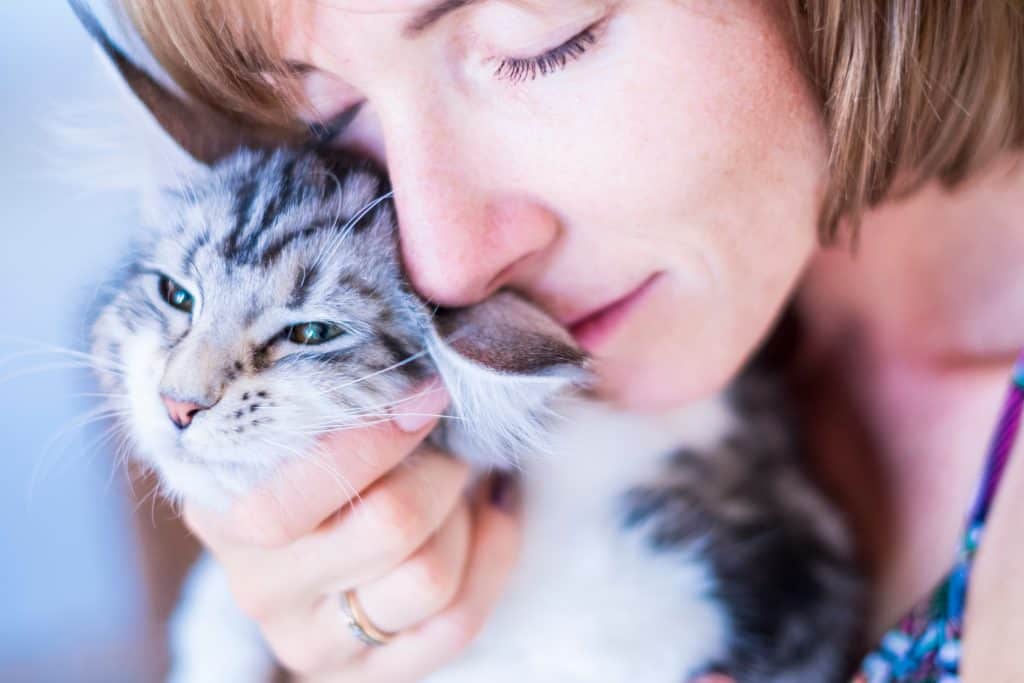
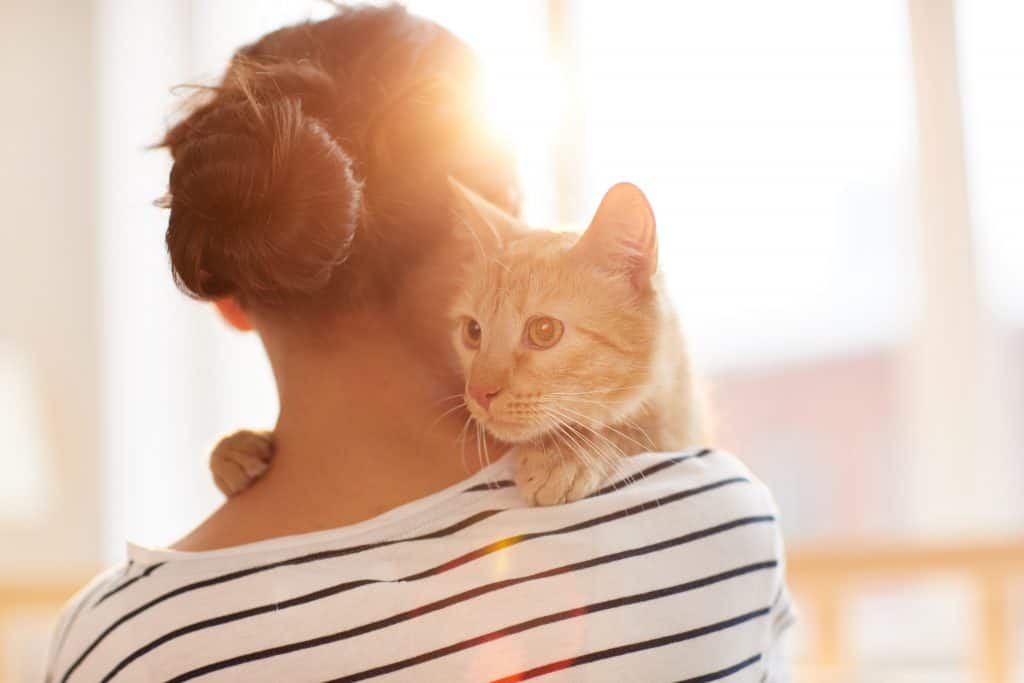

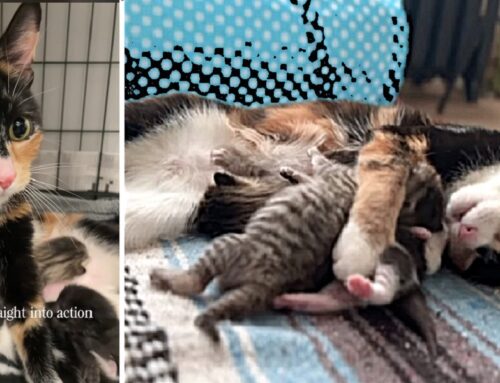
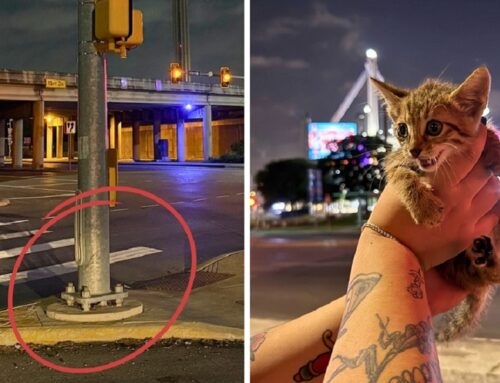
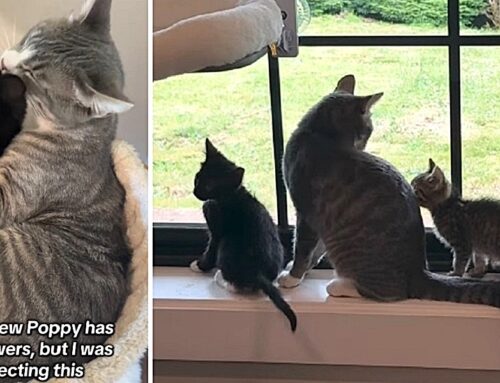
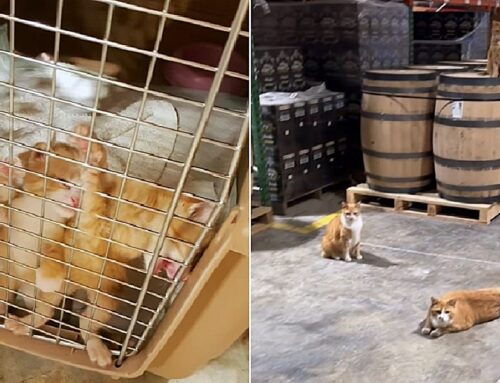
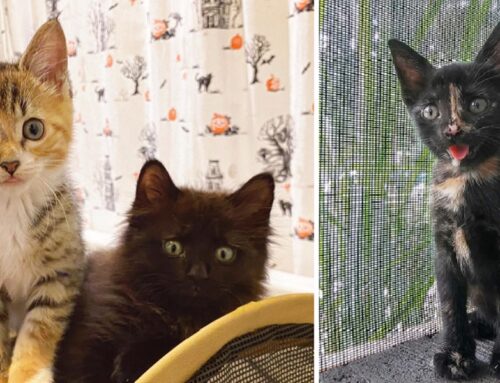


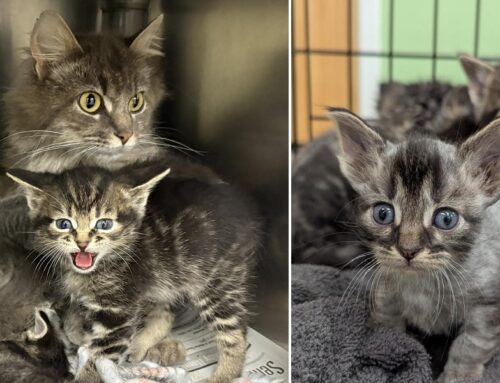
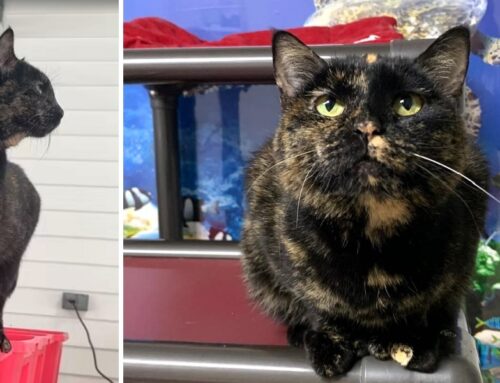
Ironic to see this today, as I’m taking my dear little Annie over the Bridge in an hour. Not my first, not my last, but you’re absolutely right. It’s never easy. Annie is a rescue, as all my cats for 50 years have been. Unwanted, abandoned, unloved – I have wanted, kept and loved each and every one of them unconditionally. Annie is 17 or 18, in kidney failure and having breathing difficulty. Meds have given us a few extra years, but it’s time now. Dear little Annie.
So sorry to hear this, Renee. Annie sounds like she had an amazing life with you. Our thoughts are with you during this difficult time. Rest in peace, sweet Annie.
Sending hugs and loves ❤️🙏
I’m so very sorry for your loss.
I have been there, and I know very well how it feels. But, because of you, Annie had a good life. Sending love…
Our first pet cat Dodge died only 2 days ago of a heart attack. He was only 1 years old. His birthday is next month, and we never get to celebrate that with him. My chest is still very tight and I am still in grief. It is really painful. He was taken unexpectedly so soon.
We are now planning to adopt a new kitty. Not to replace our first pet, but because we still have so much love to give and also to help us cope with the pain
Yesterday, I took an Uber and weirdly it has taken a long route than usual. Then suddenly in the radio the music “See you again” by Whiz Khalifa started playing, I was really trying my best not to burst in soo much tears, and then the music finishes exactly as I have been dropped off to my destination.
I feel that was my cat message to me, that one day we will see each other again ❤️
I am sooo sorry for your loss of Annie. The gut-wrenching feelings that go with doing the right thing for our babies that feels all too wrong for us. Annie sound like your ❤️ Kitty. She has lived such a long, beautiful life with you. Take comfort in knowing you gave her a beautiful life. I unexpectedly had to help my Simba on 12/31/19 and just can’t get through the loss even though I’m surrounded be 13 additional loving kitty kids. Simba was my ❤️. I will continue to love the lost and unwanted shelter, stray and feral kitties, in honor of Simba but will never be the same. God bless you as you travel through the steps of grief. Don’t let anyone diminish your feelings of loss.
So sorry to hear of your loss. It is so hard. Annie was lucky to have such a caring and loving owner such as yourself. You gave her a loving home and she knew it and loved you in return. Take all the time you require to heal your broken heart. ??
I feel your pain. We have just said goodbye to our girl Rizzoli today. Our hearts are broken.
When I lost my two 21-year old boys within a few months of each other, I was devastated. I ended up fostering a litter of 5 kittens, spaying and neutering and homing them as a memorial to Dash and Hobbes. It was a positive step forward for me, and the joy that is kittens helped me to deal with my pain, as well as putting 5 kittens into loving homes. I’d recommend this for anyone!
That’s so great, Alex! Yes, definitely agree that fostering and rescuing is a wonderful way to cope with the loss of a beloved cat. Also, Dash and Hobbs sound like they were well loved to both live to 21 years old!
It has been 2 years since my Izzie left and I still tear up thinking about her and I miss her EVERY day.
She was my best friend.
I’m so sorry Donna. My Tootsie died today. And I know I will feel just like you do about Izzie.
I feel so sad for everyone going through this terrible grief, but as bad as it is, it helps me to know I’m not alone. My sweet girl was literally ripped away and killed by someone’s loose dog. It’s been nearly two years ago, and still I cry nearly every day. Early mornings are the worst, as that was our special time together, just the two of us. She was such a special, loving girl. She was a stray who showed up ant my house and just moved right in. She was always so grateful for any small thing I did for her, and loaded with personality. I’m better, but still grieving, and I feel I should be getting over this, but I’m just not. I miss her terribly. Love to everyone else here experiencing the same things.
My 18 1/2 year old cat died in my arms yesterday. I had her from 8 weeks old. She was very special as all cats are. I will sorely miss my Merritt. Have been sharing on FB and C&M. People have been so loving and supportive in their comments. My girl decided on her own when to die. I didn’t have to make that decision. I’m thankful for that this time.In time I will get more cats but I know I know I know I need to grieve for her for as long as it takes. No rush. And I’ll be gentle with my self.
I’m so sorry for your loss. Rest in peace, sweet Merritt.
Your sad story really resonated with me. My beautiful boy. Salem, passed on Valentine’s day.2017. The day before he passed, I told him to go. if he needed to. I told my son. to do the same. On the day he passed. I wasn’t quick enough to pick him up in my arms. I just managed to get my fingertips on him. My only consolation is, that it happened so quickly. However, it still doesn’t stop me missing him, but I know I will see him again, at the rainbow bridge. I know it’s easier said than done, but please try and focus on, the good times you had together, and know that, you will see your beautiful, darling boy again.
Hi Judy , I had to put down my precious calico Patch’s on May 1 , as she finally succumbed to renal failure. I did everything I could up until that point to give her the BEST quality of Life. She was with me for over 13 years, from just 2 months old. She was my baby girl. She would hug me, dance with me, my little girl. Here on Father’s Day , I really miss her not being here, especially. I don’t think I’ll ever get over losing her. She was my World. I’m getting ready to turn 66 , don’t know if I’ll get another. God Bless you and All of the other animal lover’s out there 🙏 .
My sweet boy died unexpectedly two weeks ago.
These are great suggestions.. time also helps
but our kitties grab our hearts forever.
Before I got to the last sentence of this article I am balling my eyes out! You see I had to make the most difficult decision of having my sweet boy, love of my life euthanized last year Jan. 9th. I was so blessed to love him and him love me for nearly 8 years. I feel for those who are going through the same. May we never forgot❤?
I lost my beloved Smokey in 2005 after having him in my life for almost 20 years. I was devastated and still miss him so much to this day. I have 3 other cats now and my oldest is 14 and I know that I will be just as devastated. They are more than pets they are family.
As someone that just lost my beloved Oscar (way too soon due to FeLV), the only comfort I can give is this:
It hurts. Bad. But at the end of the day we can only take solace in the fact that although they were only part of our lives for a part of our life, we were their entire life, or at least the best part of it. We love them for the short time that they are here. Then we grieve, we cry, we mourn. All I can ask is that once you are ready, please find another animal that is in need and show that animal that humans aren’t as bad as they think. Give them the love that they so sorely miss and need.
My cat died last Monday, he wasn’t even there years old. I have lost a lot of older cats but never one do young. We adopted him at 6 months from a rescue. He was part Mainecoon and followed me around like a puppy dog. We were out of the country when he showed signs of being ill. By the time we came back he was looking like a very old kitty. The vet seemed hopeful but his little pancrious was apparently too angry and he died in the middle of the night. We also adopted two part simese girls who bonded with him. Now my husband and I as well as the other girls are grief stricken over the loss of a wonderful playful sweet boy…?? My husband and I keep having memories thinking we are seeing him and the girls walk around the house crying and looking for him… Too sad for even words…
After having my “Pretty Girl” for 15 years, ( she was abandoned in an apartment when I rescued her & she was 1-2 years old), a beautiful black smoke Persian, with big golden eyes & a sweet disposition. I had a male Norwegian Forest cat at the time & he was very jealous of her, hissing & growling at her, & she deferred to him, making no demands for attention. She was content for the first 3 years to just eat, sleep, & stay away from “ Meowser” as he was known. When he died from thyroid disease at the age of 17, ( he was a rescue also, from the SPCA) she became more social. She would catch a mouse & bring it to me, in her mouth, howling with glee as she dropped it at my feet, alive !! She never killed the mice she caught. Sweet puss,?. I took her to the Vet on January 30 th where she took her final journey on the Rainbow ? Bridge, after a year of being treated for thyroid disease, kidney disease & a tumor in the wall of her bladder, which was inoperable. I can’t even put into words just how much I miss her…??.
Just lost my Tiger on Sunday. He was diagnosed with congestive heart failure on Saturday. That night he took a turn for the worse. I couldn’t watch him suffer any further. I made the call to the vets office that morning and scheduled for that afternoon. It was hard because Tiger was my sons first pet. Tiger was only 11 yrs old. CHF can either be treated if caught early or can go overnight. It hurts, and here I am still cleaning up cat beds and toys. Not ready to let them go just yet.
I am so sorry. CHF is terrible. We lost our kitty Tiberius to that two years ago. He was diagnosed and he lived another three months with medication and then all of a sudden it just took a very bad turn. Sending you a big hug.
I lost one of my boys unexpectedly one month ago. I am devastated, he just had that ability to know when I was upset and sad, he would be in my lap right away. He slept with me every time I slept during the last 10 days my mom was with me. He actually wiped my tears. He was so special to me. RIP Phantom
When my precious cat, Snicky, died I was devastated. Snicky died in my arms while we were listening to soft music. But, moments before he died he looked up over my shoulder towards the corner of the room. His eyes got very wide and he stared at something for several moments. I looked to see what it was and I could see nothing but something got his attention. He stared very intently at whatever was there. A moment later he died. Two years earlier three of my sweet sisters died. All were cat lovers. I prayed during those final weeks of Snicky’s life, he had kidney disease and a bad heart, that one or all three of my sisters would take care of Snicky when his time came. The last night of his life I told Snicky it was ok if he had to leave me. I told him he would be loved where he was going. Someone came and escorted my precious Snicky into the kingdom. I believe we that love our precious cats and dogs and Lose them to death will see them again one day…but they take a huge part of our hearts with them. Snicky had my heart from the day he decided to make my home his. I can’t wait to see his sweet face again one day down the road in the kingdom……..❤️
So very sorry Renee, I totally understand how you feel for your sweet Annie.
I had to do the same for my precious Connie two weeks ago today, she was also a rescue kitty, approx. 12 years old. She was diabetic for the past 12 months which never really got under control even with twice daily insulin injections, in the end her kidneys gave up. My sweet baby girl is at peace at Rainbow Bridge now, my head understands but my heart hasn’t accepted it yet.
I just had to take my Suki on Monday to be euthanized. She was a beautiful yet challenging cat that I adopted at the rescue 12 years ago. I’m not sure how old she was saying but I think about baby three. She had severe thyroid disease and she couldn’t take the medication because she had a bad reaction to it. She constant chronic diarrhea and it was getting so bad she was going up to 15 or more times a day. It was time but I still feel terrible and of course after it’s done I always second-guess myself. I have three other healthy cats at home But for some reason the house was totally empty to me now.
I have found a great deal of relief after losing a kitty by making a donation quilt in “memory of” to the cat rescue that I foster for. Sometimes it takes more than one. Working with other cat-lovers gives me a support group who truly knows what I am feeling.
I just lost my Ebi Kitty a month ago. I feel the pain of his absence everyday. He was so young. Only a year and half, but he was the most special little dude. He was a rescued flame point siamese mix, and I gotta tell you, there is something about those siamese X, that are so special. A couple of weeks ago we lost him due to severe anemia, his body just wouldn’t produce red blood cells. The vets couldn’t perform a biopsy due to his weakened state, but they suspected lymphoma. One transfusion and $5000 later he seemed to improve, but the next day his counts were back down again. When there wasn’t another blood donor we made the difficult decision to let him go. Everyday I talk to him and wonder if the was more I could have done. It seems so wrong to be robbed of such a special soul so young.
My sweet Leo was putting to sleep yesterday after a big intestinal tumor was found. I’m devastated and feeling guilt because I never saw any symptoms of the tumor besides of throwing up which I thought it was normal. Leo lived 13 happy years, he never got sick until this tumor was found. He was my morning alarm, he never miss a morning to the bathroom without him being there with me. I did want euthanasia when the vet told me the tumor was huge. I didn’t listen to the vet because I was in disbelief and tried alternative medicine. Nothing worked and when he couldn’t even drink water I felt hopeless. I knew it was time but I just couldn’t imagine being the one to decide when he should leave earth. But I had to do it. I feel angry for having to choose euthanasia. But I could see the pain in his eyes and had to it. Now I full of regret why I didn’t do it earlier and avoid his suffering for even a little bit. He died in my arms and I hope he can forgive me for being a human full of mistakes!
I’m just looking for some comfort for the pain and the whole my Leo left me!
Our beautiful Ophelia was taken suddenly from us on Tuesday evening after an RTA. The vet said she died quickly and did not suffer. My heart is breaking and I cannot stop crying. The pain is awful. She was only 18 months old and was so loving and playful. I only hope this pain will subside as it’s unbearable right now. She was loved so much.
I lost my cat months ago due to the vets fault it still feels like today i am crying while commenting he was my whole life till now i miss him and I can’t get over him and it hurts alot
I just lost my Jo and Stella cats in the last two weeks. I am so devastated. The pain is so intense it feels hard to breathe. My Stella had a very traumatic ending and i am having a very hard time with this. I believe they are in Heaven, and I will see them again, but it is so very painful. They were both 15, and were my heart.
I lost my lotje 2 days ago. I’ve never felt so heartbroken. She recently turned 19 years old. She’s been losing weight and eating badly.
They suspected there was a tumor in her small intestine. I agreed to an operation and knew the risk.
But when they opened her up they saw she had mesothelioma. A cancer that doesn’t show up on scans or pictures. It was already very spread out.
They recommended putting her to sleep and not let her wake up anymore. I agreed.
I know I did the right thing but a part of me keeps wondering why, how and if that was the right choice.
Before the operation we were together for 24 hours. I made the most of that time knowing it was probably all last times.
I know it’s impossible but I just wish her back… Life is so much more difficult without her.
I understand how you feel. I refuse to believe my little one is gone. I just want to rewind time, put him in a hospital give him another chance, and I can’t. I feel barely functional. I’m so sorry.
My 4 year old had a stroke a few days ago and had to be euthanized. It was sudden , such a shock and a traumatic experience. No one locally would see him and I had to drive an hour to an emergency vet. He had such personality, slept with me, was so engaging and unusual. It is heartbreaking. I have three other cats that are missing him as well. I miss him terribly and see him in my minds eye everywhere I go in the house. I just keep telling myself its ok, I had no choice, and grieving is a process.
I am sorry for your loss, all.
I am in grief as well, so sad that my best companion Blessy (13 years old American shorthair) passed away last 19 June, a sudden death due to a heart failure.
Last 16 March,she had a stroke but then she was okay.
Then three months later (19 June 2023), she had a laboured and open-mouth breathing and she was dead at home.
I was so broken, so far Blessy used to accompany me to write my thesis.
If love could have saved her, she would have lived forever.
I just lost my little baby Goose to a horrible fight with panleukopenia. The doc prescribed hospitalization but at the time the costs scared me and I did the minimal bringing him home after a few hours iv and giving him sub q fluids. I assisted fed him every hour at the end and his little body couldn’t hold anything. He made it four days, and they survive after five. I am heartbroken. I will never make the same mistake again. He would ride on my shoulder and cuddle every time I picked him up. He was my longest bottle fed baby, and from the second I picked him up for the first time we chose each other. I will love you forever Goosey you will always be with me.
My beautiful Rudy left me this afternoon after his final battle with kidney disease. I spent lovely time with him at the vet and despite his situation, when I rubbed his head, chin and cheeks, he started to purr, despite how ill he was feeling. He eventually started to snooze using my hand as a pillow as he always has done. That felt so wonderful, like we comforted each other. Then the drugs were administered and in a very short time, he was gone. The pain is overwhelming. We were inseparable companions.
We lost our beloved Loki a week ago today to a speeding driver, we got to say goodbye, although after he had passed, it was quick and luckily he wasn’t damaged, the neighbour saw it happen and bought him to us after he had died in her arms. He was 2 years old. We buried him in our garden where he used to lay. Now I barely function, just ‘going through the motions’ and everyday i sit and ponder and miss his little toothy meow for a cuddle. My husband is upset but seems to be coping so much better than me, and that makes me more sad. I want to feel better, but feel guilty when i have an hour or so that i do. I know we will adopt again, and sometimes it gives me hope but then i feel guilty for even thinking about it. Sometimes his photos make me smile, and sometimes they make me sob and wail. Its the times of day that are triggers for me, when i would be feeding him, when i would let him out, where he would sit…. I know time will ease our pain, especially mine, he came into our lives and completely took them over! Night night little man, Mummy & Daddy miss you more than words can say. Love you always baby boy. Xxx
Upon the death of a cat in my household, I promptly bury the cat in a suitable container in my backyard. I keep several whiskers and some fur from the animal for me to touch when I have the need. If I do not already have another cat in my home, I promptly go to the local animal shelter and adopt another cat. It works for me.
I very much sympathize with everyone here who has lost a cat. Over a 20 year timeframe, I’ve lost a handful of cats and might be losing the one I have now and it hurts so much because he’s such a good boy and he’s only seven and he doesn’t deserve to leave so soon. I’ve learned that each cat I lose it doesn’t get any easier. It’s still very very hard when I thin ll about each one. Some of the comments about still thinking about that cat years after they are gone, is very true. I wonder if I could have done a better job protecting them from what killed them. I have tried with each cat after loosing one to be a better pet mom than before. It’s just very hard when you still have loss after trying harder to be a better parent. I know each of the cats that I have lost had a really good life just still hurts to lose them.
I lost my boy, PePe Le Peu on June 8th, 2023. He was my everything. I had him from 6 weeks until he turned 18 years old. He passed away as I was holding him. I miss him terribly. I know that I will see him again, waiting for me on the other side of the Bridge. R.I.P. I love you. ❤️
I have found a 24×7 chat room dedicated to pet loss : https://www.petloss.com/chat.htm
I use it not only when I’ve had a recent loss (I take care of a colony, so I’ve been taking care of ~20 cats for the last 8 years), anniversaries of passing to Rainbow Bridge, and just other times as well. There are people there many times of the day, but especially on Monday evenings (USA) for a weekly memorial service. I hope this helps.
I had to euthanize my calico cat Chloe on September 19 2021. The last year of her life she was in poor health. I found her as a kitten on October 24 2005. She gave me 16 great years. That morning she was euthanized my heart was shattered in a million pieces. I’m miss her everyday.